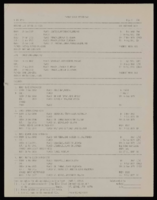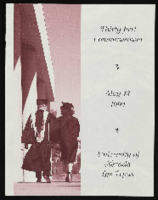Las Vegas Age
Alternate Title
Description
The Las Vegas Age was not Las Vegas's first newspaper; that distinction belongs to the short-lived Las Vegas Times which started publishing on March 25, 1905. But only two weeks later, on April 7, C.W. Nicklin founded what was the not-yet-a-city's third paper, the Age. Nicklin edited and published the Age from the Overland Hotel each Saturday as a six-page independent weekly, at $2 per year. When the railroad finally arrived, and laid out and auctioned off the town lots, the Age and its two competitors, the Times and the Advance, boomed with the new town amid lively journalistic debate. The Age briefly triumphed when the Times and Advance collapsed, until new competition arrived, and Nicklin left the Age to his partner Charles C. Corkhill to give his attention to his other paper, the Beatty Bullfrog Miner. Corkhill struggled for two years as editor and publisher, as Las Vegas languished in post-boom depression, then persuaded local businessman Charles P. "Pop" Squires to buy the paper, only after repeatedly dropping the price. Thus began the long and fruitful newspaper career of Charles Squires, sole editor and proprietor of the Age for almost forty years. Even after he sold the paper in 1943, he continued as editor until its last owner, Frank Garside of the Review-Journal, suspended publication of the Age on November 30, 1947.
As the Las Vegas Age, under Squires' shrewd editorship, dominated its local competition as the leading local newspaper with the largest circulation, it also became the leading paper in Southern Nevada. When Las Vegas was founded it was a remote railroad establishment far from the seat of Lincoln County, in Pioche where the county's leading newspaper and the paper of legal record was the Lincoln County Record, which had been in business since 1871. With the rapid growth of Las Vegas and the decline of the Pioche mining district, the population of southern Nevada shifted to the south and the divisions between the southern and northern sections of Lincoln County, which covered the whole of southeastern Nevada, became politically heated. When the Age began publication in Las Vegas in 1905, with a larger circulation than the Record in Pioche, the county commissioners decided to award to the Age all county printing and job work. The editor of the Record, not surprisingly, was enraged and commenced a series of personal attacks on the Age and the residents of Las Vegas, likening the Age to a mushroom fungi of uncertain life, possessing a readership of "floaters, the shiftless and reckless class."
Squires became the city's foremost booster and the Age became his trumpet, fighting for the division of Lincoln County that created Clark County, or for the new dam (an original member of Nevada's Colorado River Commission, Squires was in charge of publicity), or promoting as a one-man Chamber of Commerce civic and community organizations and projects or the city's nascent tourism and resort industry. Thus, the Age became the Voice of Las Vegas, as well as the most respected "paper of record" for the city. Other newspapers came and went, some were political adversaries (Squires was a staunch conservative, pro-business Republican), and some became well-established. But the Age remained the essential Las Vegas newspaper, from its fiercely independent editorials, to its boosterism and its comprehensive reporting of the simple everyday doings of this boisterous and dynamic new city.
See full information about this title online through Nevada's participation in the National Digital Newspaper Project. All issues digitized online at: Chronicling America collection from the Library of Congress.
1932
May
- Las Vegas Age, Vol. 28, No. 105 (1932-05-01)
- Las Vegas Age, Vol. 28, No. 106 (1932-05-03)
- Las Vegas Age, Vol. 28, No. 107 (1932-05-04)
- Las Vegas Age, Vol. 28, No. 108 (1932-05-05)
- Las Vegas Age, Vol. 28, No. 109 (1932-05-06)
- Las Vegas Age, Vol. 28, No. 110 (1932-05-07)
- Las Vegas Age, Vol. 28, No. 111 (1932-05-08)
- Las Vegas Age, Vol. 28, No. 113 (1932-05-10)
- Las Vegas Age, Vol. 28, No. 114 (1932-05-11)
- Las Vegas Age, Vol. 28, No. 115 (1932-05-12)
- Las Vegas Age, Vol. 28, No. 116 (1932-05-13)
- Las Vegas Age, Vol. 28, No. 117 (1932-05-14)
- Las Vegas Age, Vol. 28, No. 118 (1932-05-15)
- Las Vegas Age, Vol. 28, No. 119 (1932-05-17)
- Las Vegas Age, Vol. 28, No. 120 (1932-05-18)
- Las Vegas Age, Vol. 28, No. 121 (1932-05-19)
- Las Vegas Age, Vol. 28, No. 122 (1932-05-20)
- Las Vegas Age, Vol. 28, No. 123 (1932-05-21)
- Las Vegas Age, Vol. 28, No. 124 (1932-05-22)
- Las Vegas Age, Vol. 28, No. 125 BOULDER CITY AGE (1932-05-24)
- Las Vegas Age, Vol. 28, No. 126 (1932-05-25)
- Las Vegas Age, Vol. 28, No. 127 (1932-05-26)
- Las Vegas Age, Vol. 28, No. 128 (1932-05-27)
- Las Vegas Age, Vol. 28, No. 129 (1932-05-28)
- Las Vegas Age, Vol. 28, No. 130 (1932-05-29)
- Las Vegas Age, Vol. 28, No. 131 (1932-05-31)
June
- Las Vegas Age, Vol. 28, No. 132 (1932-06-01)
- Las Vegas Age, Vol. 28, No. 133 (1932-06-02)
- Las Vegas Age, Vol. 28, No. 134 (1932-06-03)
- Las Vegas Age, Vol. 28, No. 135 (1932-06-04)
- Las Vegas Age, Vol. 28, No. 136 (1932-06-05)
- Las Vegas Age, Vol. 28, No. 137 (1932-06-07)
- Las Vegas Age, Vol. 28, No. 138 (1932-06-08)
- Las Vegas Age, Vol. 28, No. 139 (1932-06-09)
- Las Vegas Age, Vol. 28, No. 140 (1932-06-10)
- Las Vegas Age, Vol. 28, No. 141 (1932-06-11)
- Las Vegas Age, Vol. 28, No. 142 (1932-06-12)
- Las Vegas Age, Vol. 28, No. 143 (1932-06-14)
- Las Vegas Age, Vol. 28, No. 144 (1932-06-15)
- Las Vegas Age, Vol. 28, No. 145 (1932-06-16)
- Las Vegas Age, Vol. 28, No. 146 (1932-06-17)
- Las Vegas Age, Vol. 28, No. 147 (1932-06-18)
- Las Vegas Age, Vol. 28, No. 148 (1932-06-19)
- Las Vegas Age, Vol. XXVIII, No. 149 (1932-06-21)
- Las Vegas Age, Vol. XXVIII, No. 150 (1932-06-22)
- Las Vegas Age, Vol. 28, No. 151 (1932-06-23)
- Las Vegas Age, Vol. 28, No. 152 (1932-06-24)
- Las Vegas Age, Vol. 28, No. 153 (1932-06-25)
- Las Vegas Age, Vol. 28, No. 154 (1932-06-26)
- Las Vegas Age, Vol. 28, No. 155 (1932-06-28)
- Las Vegas Age, Vol. 28, No. 156 (1932-06-29)
- Las Vegas Age, Vol. 28, No. 157 (1932-06-30)
July
- Las Vegas Age, Vol. XXVIII, No. 158 (1932-07-01)
- Las Vegas Age, Vol. XXVIII, No. 159 (1932-07-02)
- Las Vegas Age, Vol. XXVIII, No. 160 (1932-07-03)
- Las Vegas Age, Vol. XXVIII, No. 161 (1932-07-06)
- Las Vegas Age, Vol. XXVIII, No. 162 (1932-07-07)
- Las Vegas Age, Vol. XXVIII, No. 163 (1932-07-08)
- Las Vegas Age, Vol. XXVIII, No. 164 (1932-07-09)
- Las Vegas Age, Vol. XXVIII, No. 165 (1932-07-10)
- Las Vegas Age, Vol. XXVIII, No. 166 (1932-07-12)
- Las Vegas Age, Vol. XXVIII, No. 167 (1932-07-13)
- Las Vegas Age, Vol. XXVIII, No. 168 (1932-07-14)
- Las Vegas Age, Vol. XXVIII, No. 169 (1932-07-15)
- Las Vegas Age, Vol. XXVIII, No. 170 (1932-07-16)
- Las Vegas Age, Vol. XXVIII, No. 171 (1932-07-17)
- Las Vegas Age, Vol. XXVIII, No. 172 (1932-07-19)
- Las Vegas Age, Vol. XXVIII, No. 173 (1932-07-20)
- Las Vegas Age, Vol. XXVIII, No. 174 (1932-07-21)
- Las Vegas Age, Vol. XXVIII, No. 175 (1932-07-22)
- Las Vegas Age, Vol. XXVIII, No. 176 (1932-07-23)
- Las Vegas Age, Vol. XXVIII, No. 177 (1932-07-24)
- Las Vegas Age, Vol. XXVIII, No. 178 (1932-07-26)
- Las Vegas Age, Vol. XXVIII, No. 179 (1932-07-27)
- Las Vegas Age, Vol. XXVIII, No. 180 (1932-07-28)
- Las Vegas Age, Vol. XXVIII, No. 181 (1932-07-29)
- Las Vegas Age, Vol. XXVIII, No. 182 (1932-07-30)
- Las Vegas Age, Vol. XXVIII, No. 183 (1932-07-31)
August
- Las Vegas Age, Vol. XXVIII, No. 184 (1932-08-02)
- Las Vegas Age, Vol. XXVIII, No. 185 (1932-08-03)
- Las Vegas Age, Vol. XXVIII, No. 186 (1932-08-04)
- Las Vegas Age, Vol. XXVIII, No. 187 (1932-08-05)
- Las Vegas Age, Vol. XXVIII, No. 188 (1932-08-06)
- Las Vegas Age, Vol. XXVIII, No. 189 (1932-08-07)
- Las Vegas Age, Vol. XXVIII, No. 190 (1932-08-09)
- Las Vegas Age, Vol. XXVIII, No. 191 (1932-08-10)
- Las Vegas Age, Vol. XXVIII, No. 192 (1932-08-11)
- Las Vegas Age, Vol. XXVIII, No. 193 (1932-08-12)
- Las Vegas Age, Vol. XXVIII, No. 194 (1932-08-13)
- Las Vegas Age, Vol. XXVIII, No. 195 (1932-08-14)
- Las Vegas Age, Vol. XXVIII, No. 196 (1932-08-16)
- Las Vegas Age, Vol. XXVIII, No. 197 (1932-08-17)
- Las Vegas Age, Vol. XXVIII, No. 198 (1932-08-18)
- Las Vegas Age, Vol. XXVIII, No. 199 (1932-08-19)
- Las Vegas Age, Vol. XXVIII, No. 200 (1932-08-20)
- Las Vegas Age, Vol. XXVIII, No. 201 (1932-08-21)
- Las Vegas Age, Vol. XXVIII, No. 202 (1932-08-23)
- Las Vegas Age, Vol. XXVIII, No. 203 (1932-08-24)
- Las Vegas Age, Vol. XXVIII, No. 204 (1932-08-25)
- Las Vegas Age, Vol. XXVIII, No. 205 (1932-08-26)
- Las Vegas Age, Vol. XXVIII, No. 206 (1932-08-27)
- Las Vegas Age, Vol. XXVIII, No. 207 (1932-08-28)
- Las Vegas Age, Vol. XXVIII, No. 208 (1932-08-30)
- Las Vegas Age, Vol. XXVIII, No. 209 (1932-08-31)
September
- Las Vegas Age, Vol. XXVIII, No. 210 (1932-09-01)
- Las Vegas Age, Vol. XXVIII, No. 211 (1932-09-02)
- Las Vegas Age, Vol. XXVIII, No. 212 (1932-09-03)
- Las Vegas Age, Vol. XXVIII, No. 213 (1932-09-04)
- Las Vegas Age, Vol. XXVIII, No. 214 (1932-09-06)
- Las Vegas Age, Vol. XXVIII, No. 215 (1932-09-07)
- Las Vegas Age, Vol. XXVIII, No. 216 (1932-09-08)
- Las Vegas Age, Vol. XXVIII, No. 217 (1932-09-09)
- Las Vegas Age, Vol. XXVIII, No. 218 (1932-09-10)
- Las Vegas Age, Vol. XXVIII, No. 219 (1932-09-11)
- Las Vegas Age, Vol. XXVIII, No. 220 (1932-09-13)
- Las Vegas Age, Vol. XXVIII, No. 221 (1932-09-14)
- Las Vegas Age, Vol. XXVIII, No. 222 (1932-09-15)
- Las Vegas Age, Vol. XXVIII, No. 223 (1932-09-16)
- Las Vegas Age, Vol. XXVIII, No. 224 (1932-09-17)
- Las Vegas Age, Vol. XXVIII, No. 225 (1932-09-18)
- Las Vegas Age, Vol. XXVIII, No. 226 (1932-09-20)
- Las Vegas Age, Vol. XXVIII, No. 227 (1932-09-21)
- Las Vegas Age, Vol. XXVIII, No. 228 (1932-09-22)
- Las Vegas Age, Vol. XXVIII, No. 229 (1932-09-23)
- Las Vegas Age, Vol. XXVIII, No. 230 (1932-09-24)
- Las Vegas Age, Vol. XXVIII, No. 231 (1932-09-25)
- Las Vegas Age, Vol. XXVIII, No. 232 (1932-09-27)
- Las Vegas Age, Vol. XXVIII, No. 233 (1932-09-28)
- Las Vegas Age, Vol. XXVIII, No. 234 (1932-09-29)
- Las Vegas Age, Vol. XXVIII, No. 235 (1932-09-30)
October
- Las Vegas Age, Vol. XXVIII, No. 236 (1932-10-01)
- Las Vegas Age, Vol. XXVIII, No. 237 (1932-10-02)
- Las Vegas Age, Vol. XXVIII, No. 238 (1932-10-04)
- Las Vegas Age, Vol. XXVIII, No. 239 (1932-10-05)
- Las Vegas Age, Vol. XXVIII, No. 240 (1932-10-06)
- Las Vegas Age, Vol. XXVIII, No. 241 (1932-10-07)
- Las Vegas Age, Vol. XXVIII, No. 242 (1932-10-08)
- Las Vegas Age, Vol. XXVIII, No. 243 (1932-10-09)
- Las Vegas Age, Vol. XXVIII, No. 244 (1932-10-11)
- Las Vegas Age, Vol. XXVIII, No. 245 (1932-10-12)
- Las Vegas Age, Vol. XXVIII, No. 246 (1932-10-13)
- Las Vegas Age, Vol. XXVIII, No. 247 (1932-10-14)
- Las Vegas Age, Vol. XXVIII, No. 248 (1932-10-15)
- Las Vegas Age, Vol. XXVIII, No. 249 (1932-10-16)
- Las Vegas Age, Vol. XXVIII, No. 250 (1932-10-18)
- Las Vegas Age, Vol. XXVIII, No. 251 (1932-10-19)
- Las Vegas Age, Vol. XXVIII, No. 252 (1932-10-20)
- Las Vegas Age, Vol. XXVIII, No. 253 (1932-10-21)
- Las Vegas Age, Vol. XXVIII, No. 254 (1932-10-22)
- Las Vegas Age, Vol. XXVIII, No. 255 (1932-10-23)
- Las Vegas Age, Vol. 28, No. 256 (1932-10-25)
- Las Vegas Age, Vol. XXVIII, No. 257 (1932-10-26)
- Las Vegas Age, Vol. XXVIII, No. 258 (1932-10-27)
- Las Vegas Age, Vol. XXVIII, No. 259 (1932-10-28)
- Las Vegas Age, Vol. XXVIII, No. 260 (1932-10-29)
- Las Vegas Age, Vol. XXVIII, No. 261 (1932-10-30)
November
- Las Vegas Age, Vol. XXVIII, No. 262 (1932-11-01)
- Las Vegas Age, Vol. XXVIII, No. 263 (1932-11-02)
- Las Vegas Age, Vol. XXVIII, No. 264 (1932-11-03)
- Las Vegas Age, Vol. XXVIII, No. 265 (1932-11-04)
- Las Vegas Age, Vol. XXVIII, No. 266 (1932-11-05)
- Las Vegas Age, Vol. XXVIII, No. 267 (1932-11-06)
- Las Vegas Age, Vol. XXVIII, No. 268 (1932-11-08)
- Las Vegas Age, Vol. XXVIII, No. 269 (1932-11-09)
- Las Vegas Age, Vol. XXVIII, No. 270 (1932-11-10)
- Las Vegas Age, Vol. XXVIII, No. 271 (1932-11-11)
- Las Vegas Age, Vol. XXVIII, No. 272 (1932-11-12)
- Las Vegas Age, Vol. XXVIII, No. 273 (1932-11-13)
- Las Vegas Age, Vol. XXVIII, No. 274 (1932-11-15)
- Las Vegas Age, Vol. XXVIII, No. 275 (1932-11-16)
- Las Vegas Age, Vol. XXVIII, No. 276 (1932-11-17)
- Las Vegas Age, Vol. XXVIII, No. 277 (1932-11-18)
- Las Vegas Age, Vol. XXVIII, No. 278 (1932-11-19)
- Las Vegas Age, Vol. XXVIII, No. 279 (1932-11-20)
- Las Vegas Age, Vol. XXVIII, No. 271 (1932-11-22)
- Las Vegas Age, Vol. XXVIII, No. 272 (1932-11-23)
- Las Vegas Age, Vol. XXVIII, No. 282 (1932-11-24)
- Las Vegas Age, Vol. XXVIII, No. 283 (1932-11-26)
- Las Vegas Age, Vol. XXVIII, No. 284 (1932-11-27)
- Las Vegas Age, Vol. XXVIII, No. 285 (1932-11-29)
- Las Vegas Age, Vol. XXVIII, No. 286 (1932-11-30)
December
- Las Vegas Age, Vol. XXVIII, No. 287 (1932-12-01)
- Las Vegas Age, Vol. XXVIII, No. 288 (1932-12-02)
- Las Vegas Age, Vol. XXVIII, No. 289 (1932-12-03)
- Las Vegas Age, Vol. XXVIII, No. 290 (1932-12-04)
- Las Vegas Age, Vol. XXVIII, No. 291 (1932-12-06)
- Las Vegas Age, Vol. XXVIII, No. 292 (1932-12-07)
- Las Vegas Age, Vol. XXVIII, No. 293 (1932-12-08)
- Las Vegas Age, Vol. XXVIII, No. 294 (1932-12-09)
- Las Vegas Age, Vol. XXVIII, No. 295 (1932-12-10)
- Las Vegas Age, Vol. XXVIII, No. 296 (1932-12-11)
- Las Vegas Age, Vol. XXVIII, No. 297 (1932-12-13)
- Las Vegas Age, Vol. XXVIII, No. 298 (1932-12-14)
- Las Vegas Age, Vol. XXVIII, No. 299 (1932-12-15)
- Las Vegas Age, Vol. XXVIII, No. 300 (1932-12-16)
- Las Vegas Age, Vol. XXVIII, No. 301 (1932-12-17)
- Las Vegas Age, Vol. XXVIII, No. 302 (1932-12-18)
- Las Vegas Age, Vol. XXVIII, No. 303 (1932-12-20)
- Las Vegas Age, Vol. XXVIII, No. 303 (1932-12-21)
Language
English









